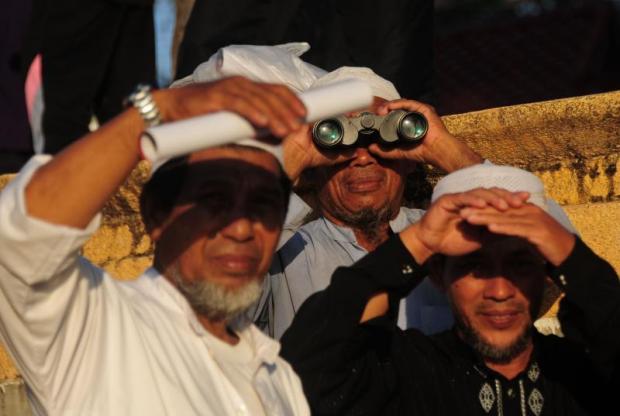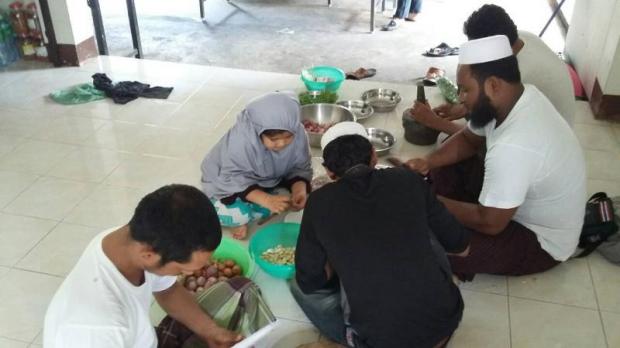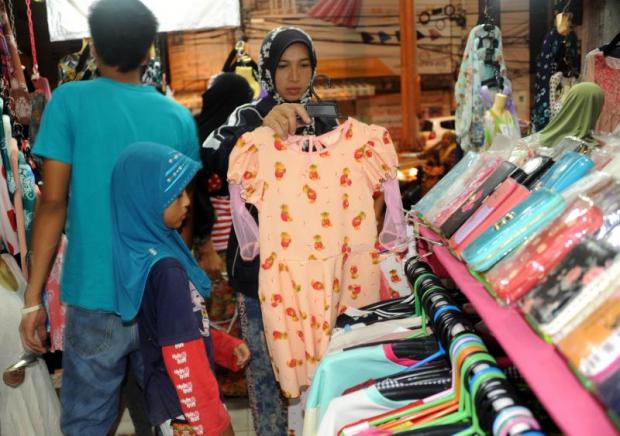
Ramadan is the ninth month in the Islamic calendar. During this holy month, all adult Muslims are required to fast and refrain from sexual activity during the day and not smoke. However, Ramadan is more than abstinence and Muslims are encouraged to contemplate their devotion to God and the welfare of others.
Fasting is from sunrise to sunset. After sunset we can eat as much as we like, but of course it must be done with a mindful heart. In that sense we can eat halal food but we shouldn't waste it and we should share with others. The main reason behind fasting is to thank God for the food and all the blessings he has provided. Ramadan teaches us patience and to be considerate of the less fortunate. Ramadan limitations are the same for all Muslims -- from poor to rich.
I vividly remember my first Ramadan. I was born into a Muslim family so I had seen older family members fasting during Ramadan since I was very young. It has been a part of life ever since I could remember.
I must have been about seven years old when I had my first fasting experience. It was a half-day fasting "trial", not a full sunrise to sunset like my adult Ramadan experience. I vividly recall standing at the ice box to inhale the cold air, which I thought would keep me refreshed and literally "alive", while my eyes constantly stared at the clock, impatiently counting each second as the hand ticked by. It seemed like the clock was trying to fool me, each hour seemed to take forever to pass.
While waiting for the clock to hit noon, I would find all the food and drink I wanted and have them on the table, so that when the time was up I would be ready and wouldn't waste a second eating and drinking everything I had prepared. That part was heaven for me.
I didn't understand, or appreciate much, the value of Ramadan then. But I was proud of the few half days fasting I had achieved. It felt as though I was receiving an Olympic gold medal -- the non-Muslim kids couldn't possibly have accomplished what I had done.
But when we become adults, Muslims are expected to fast for the entire day. According to Islam, adulthood starts when one hits puberty. A boy is considered a man when he experiences his first wet dream, while a girl is considered a woman upon menstruation or when she turns 15.
I can't remember everything about my first full day fasting as an adult, but I do recall that the experience did not feel much different from my half-day trial. I also did not manage to complete the whole month.
My first full month fasting was in 2006 when I was 26. I'd started praying five times a day >> >> and was strictly refraining from non-halal meat, wearing a hijab and doing everything I could possibly do to be a good Muslim. I chose to become a practising Muslim -- meaning I was not just Muslim by birth but I was embracing Islam and incorporating the practices into my everyday life. It was a life choice that gave me a confidence I have never questioned since.
My close friends and immediate family members were surprised. Some were glad to see my change while others questioned it. I asked myself the same question: "What transformed me?" It's very simple -- I guess when you grow up, you gain more life experience and you choose the kind of person you want to become.
When you are determined, everything is easy. My first full day and full month fasting was stress-free. It was fun and full of meaning. I woke up about 3.30am, and didn't feel sluggish about praying. I ate Suhoor (a predawn meal) which helped me refrain from eating and drinking throughout the day.

FAMILY TIES: Top, Vichaya Pitsuwan's husband, Somchok Ngamsomchart, cooks for the Muslim community in Chiang Mai. Above, Ms Vichaya, Mr Somchok and their daughter, Alesha Pitsuwan, left, with a family friend. Photos: Vichaya Pitsuwan
At sunset I broke my fast with water and dates. Breaking your fast by drinking water and eating dates is encouraged -- this was practised by the Prophet (peace be upon him). I took my tarawih (special evening prayers after the last compulsory prayer of the day -- only conducted during Ramadan) at the masjid (mosque) close to my house.
Those who are ill or travelling are exempt from fasting. The elderly, who could suffer ill health from the experience, are not required to fast. Pregnant and menstruating women are also exempt, although they fast at a later date to compensate.
Ramadan is the month when the holy Koran was revealed. It is the most rewarding month to give to charity; to study and recite the Koran; to ask for forgiveness from God; and to ask God for what you desire.
Laylat Al-Qadr, the day which the Prophet Mohammad (peace be upon him) said, "Any Muslim who stands in Prayer during Laylat Al-Qadr out of faith and sincerity, his previous sins will be forgiven" falls on one of the last 10 days of Ramadan.
All Muslims wanting the best out of the fasting month look forward to this night. They believe appeals sought on this night will be granted.
Some men perform itikaf, where they stay at a mosque where extra prayers are offered, reciting the Koran, supplicating and leaving behind worldly commitments. Women are encouraged to do the same, but it's best for them to do it at home.
To me, Ramadan is the month when I can devote more time to religious obligation. It is also a month of greater human interaction. When everyone is hungry, you automatically become more sympathetic. It comes naturally. Your charity to the less fortunate is with a pure heart because you know exactly how hunger and thirst feel. You want to do good deeds, to help others, to be thankful with what you have and to wish for rewards in this and the life after.
It is also the month of learning. My six-year-old daughter, Alesha Pitsuwan, managed to fast 20 full days during Ramadan last year, a major jump from a few half days of fasting a year earlier. She performed much better than me in my childhood. We did not force her to fast. She requested to be a part of the practice.
It taught her to be more caring towards others. She learned what it is like to be hungry and to better appreciate everything she has. She is a chubby, food-loving girl and fasting has not done anything to change her body weight. She is still an outgoing girl, so fasting has not done anything to her mental state.
Some people disagree with a young child fasting, but it is simply a change in eating schedule. It is not harmful. In fact, some studies show that fasting is actually good for your health. My young daughter is determined to at least keep her record this year. Anhamdulilah! (praise be to God, often said when you are happy with what God has granted you).
Ramadan is also a month of family reunion. Family members who stay in different parts of the world take their holidays for a get-together during this month. Friends who barely see each other also use fast-breaking as an opportunity to organise a happy reunion. Neighbours cook their specialities and share them around the neighbourhood. Restaurants also change their opening hours to fit Ramadan requirements and offer special meals at good prices. Not surprisingly, it is also the best-selling month for date shops.
It is also a month for building political connections. Delegates from all foreign Islamic countries are invited to join iftar (fast-breaking), organised by the Central Islamic Foundation, the Central Islamic Committee, the Royal Thai Government and the US Embassy.
In addition, Ramadan is a good month for some businesses. A holiday called Eid Al Fitr marks the end of Ramadan, whereby all Muslims are encouraged to offer a special Eid prayer at the mosque. On this day, Muslims are encouraged to wear new clothes, decorate their houses and prepare party food to welcome relatives and friends. Islamic clothing stores start taking orders before or during Ramadan to make sure their clients have new clothes ready for Eid.
In the southernmost provinces of Thailand, gold shops witness an influx of buyers a few days before Eid. Wearing gold on Eid is the norm for Muslims in this part of the country as well as in Myanmar.
In Chiang Mai, a free food "tour" convenes for three days. On the first day of Eid, the Muslim houses in the city areas of Chang Klan and Chang Puak have an open house filled with specialities to welcome visitors.
The beauty of it is you don't need to know each other, everyone is welcome, free of charge and the free food is unlimited. It is eat-till-you-drop -- an eating spree!
On the second day, the same thing is offered by the houses in the area of Doi Saket and San Kamphaeng. All the traditional northern delicacies like khanom jean nam ngew (noodles with northern style soup), khao soi (fried noodle curry soup), laab or even khao kan jin (rice steamed with blood), which is rare to find in halal restaurants, are on offer.
On the third day, it's the turn for houses in Mae Heah, San Pa Tong and Hang Dong. My house offers deep fried mutton ribs, to be eaten with sticky rice and nam prik noom (young chilli dip). We are renowned for the dish.
I don't know when this fest started, but it has happened every one of the 10 years I have lived in Chiang Mai -- and the hospitality is impressive.
As a southerner who is married to a northerner, this is the beauty of Eid in the North. The North is home to a much smaller number of Muslims than the South.
Ramadan is meaningful in many ways. It is a heartwarming month. I welcome it with my arms open wide.
Vichaya Pitsuwan is a former Bangkok Post journalist.


THE FAST IS OVER: Top, Vichaya Pitsuwan's daughter Alesha helps in the kitchen. Above, the food prepared as food is distributed among the Chiang Mai Muslim community.

FASHION PASSION: Thai Muslim villagers shop for clothes to mark the end of Ramadan.
